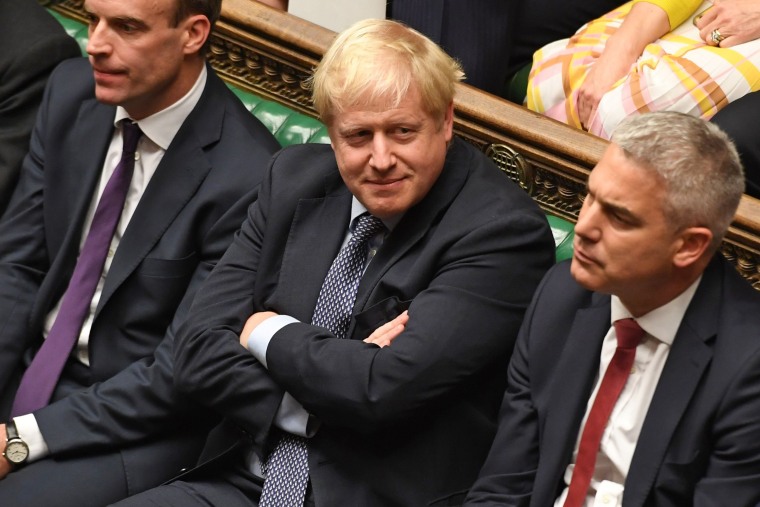LONDON — Just days after the release of a letter in which President Donald Trump urged his Turkish counterpart not to be a “tough guy” or a “fool,” another correspondence from a world leader has set off a public firestorm.
British Prime Minister Boris Johnson sent European leaders an unsigned letter late Saturday, fulfilling his legal obligation to request a Brexit extension. But he also sent another note saying he was opposed to further delay, which he claimed would be "deeply corrosive."
Johnson once vowed he would rather be “dead in a ditch” than ask for an extension to the U.K.’s current Oct. 31 deadline to leave the European Union, but lawmakers in Parliament forced his hand.
So after a day of yet more Brexit drama — in which Johnson was denied a potentially decisive vote on his divorce deal, and instead forced to request the delay — the prime minister sent not one but three letters to Brussels.
First, a brief cover note from Britain's E.U. envoy explaining the government was simply complying with the law; second, an unsigned photocopy of the text that the law forced him to write; and a third letter in which Johnson outlined his opposition to an extension.
Further delay "would damage the interests of the U.K. and our E.U. partners, and the relationship between us," Johnson said. “We must bring this process to a conclusion.”

Despite the prime minister’s insistence on expressing his personal opposition to the idea, E.U. leaders acknowledged that they had received the U.K.’s extension request and would consider it.
The E.U.'s chief Brexit negotiator, Michel Barnier, said officials would consult "in the next days."
Johnson's government, meanwhile, continued to insist it would lead Britain out of the bloc as currently scheduled.
"We are going to leave by Oct. 31st," his minister in charge of Brexit Michael Gove told Sky News. "We have the means and the ability to do so."
'Straight out of the Trump rulebook'
Johnson’s move drew fierce criticism, with the letters becoming just the latest battle in an existential struggle that has gripped the country since it voted to leave the bloc in a June 2016 referendum.
Johnson could face legal challenges from opponents who feel that sending the second letter was done to frustrate Parliament.
The opposition Labour Party's Brexit spokesman Keir Starmer said Sunday that the prime minister "is being childlike." Finance spokesman John McDonnell said he was "treating Parliament and the Courts with contempt."
David Lammy, a Labour lawmaker and prominent advocate of staying in the E.U., said the gambit was “straight out of the Trump rulebook.”
The prime minister has drawn frequent comparisons to Trump for his unconventional style, hardline policies and uncompromising approach.
Johnson has repeatedly accused his opponents of “surrender” to the E.U. by forcing further delay, leading to criticism that he is stoking tensions amid the increasingly febrile atmosphere in the country.
Lawmakers sought the latest delay Saturday to buy more time to scrutinize and possibly tweak Johnson’s plans.
They also want to avoid the risk of the U.K. crashing out of the E.U. without a deal at all, an extreme scenario that forecasts suggest could cause economic pain, food shortages and even civil unrest.
Despite Saturday’s setbacks, Johnson has vowed to bring his divorce deal for a vote again next week.
If he can secure enough support, the government will attempt to rush it into law and render any extension beyond Oct. 31 unnecessary.
But the delay has opened the door to other possibilities, including an election or second referendum.
Perhaps all that is clear is that the division and turmoil that have characterised the Brexit process are alive and well.


